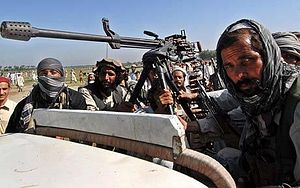LAHORE—In a nation almost constantly reeling under years of repeated bombings by militants, the one on August 8 is still a shock. A massive blast in Quetta, the capital of Balochistan province and home to the leadership of the Afghan Taliban, killed more than 70 people, including at least 55 lawyers.
In a flash, almost one-third of the members of the Quetta Bar association were dead.
This was a particularly callous attack. The lawyers had congregated at the emergency ward of the main government hospital after hearing that their colleague, Bilal Anwar Kasi, had been shot dead. The attackers waited until the lawyers gathered before they set off the bomb, which also killed hospital workers and journalists.
I spent two weeks in Quetta in June 2014 doing research for a Human Rights Watch report. Almost every lawyer that we met, all deeply committed to civil liberties, is either dead or critically injured. Among the dead are friends of my brother, people who went to school with my cousins, and people I had tea with in the bar room of the Sessions court in Quetta.
I also lost my good friend Arbab Gulzareen Kasi. At least five members of Gulzareen’s family also died that Monday. “You don’t understand many things,” Gulzareen once said to me. “It is because you and I live in different countries.” I knew what he meant. I live in Lahore, Punjab, “mainland Pakistan,” home to the country’s elite. Though surrounded by war and subject to frequent terror attacks, Punjab is nevertheless tranquil compared to Balochistan, which has been the site of unabated sectarian, government, and Taliban violence for years.
Many of the dead were persistent advocates for the missing people of Balochistan, the victims of a state policy of enforced disappearances. According to a recent government report, around 1000 bullet ridden bodies have been recovered from Balochistan in the past six years.
Balochistan is Pakistan’s largest province by size, bordering Afghanistan and Iran. It is the epicenter of multiple ethnic, nationalist and sectarian conflicts, with Pakistan’s security forces and Baloch nationalists demanding a right to self-determination in a longstanding state of often violent confrontation. It is also home to the leadership of the Afghan Taliban, colloquially known as the “Quetta Shura.” Balochistan has massive mineral resources and is a key link for China between Xinjiang and the Arabian Sea.
The government’s response to the August 8 attack, for which both ISIS and the Taliban have claimed responsibility, added insult to injury. Officials and politicians have tried to blame almost anyone but the culprits. Some blamed the Afghan intelligence agency, while others blamed Iran. A member of the opposition Pakistan Theerik-i-Insaf (PTI) said that Prime Minister Nawaz Sharif’s government may have been behind the attack to distract attention from corruption allegations linked to the “Panama Papers.” In a blatant attempt to avoid responsibility for failing to provide security from yet another militant attack, within minutes of the explosion Balochistan’s Chief Minister blamed the Indian intelligence agency.
There is a sick irony at play here: Many of those who died were human rights defenders and activists whom the Pakistani government had previously and wrongly labeled as “foreign agents,” a reference to India; in death they have been conveniently branded as victims of those same “foreign agents.”
The Army Chief came up with an even more fanciful explanation, saying on a visit to Quetta that “this is an attack on the China-Pakistan Economic Corridor development project” in a transparent attempt to blame so-called foreign actors for the slaughter. It seems not to have occurred to him that suggesting 70 people died to delay the construction of a bunch of roads and bridges is no way to honor their memory.
All of this is sadly emblematic of the way the Pakistani military and civilian establishment regularly try to obfuscate the facts when faced with the well-documented reality that the militant groups they helped create – and continue to protect as they prop up some groups while rounding up others – are killing the people of Pakistan. This double game has a long history. The army and Inter-Services Intelligence (ISI) agency have used militants to destabilize Afghanistan as part of its policy of “strategic depth.” When blowback occurs and the clients attack their patrons, the country’s leaders seem ready to blame anyone but the militant groups who have been responsible for hundreds of such attacks in the past ten years.
The authorities aren’t fooling anyone in Pakistan – or abroad. Just two weeks ago the United States, which for too long has turned a blind eye, reluctantly withheld $300 million in military assistance because it concluded that Pakistan is being “selective” in combatting terrorism.
The death toll from militant attacks will keep mounting so long as the murders of Gulzareen and others are not addressed by the government head-on. The army and intelligence services have to end their double game of saying they are fighting terrorism while at the same time allowing their allies to set off bombs.
The shameful denial of the government to even name the perpetrators, while their preferred militants devour the nation, has to end.
Saroop Ijaz is the Pakistan Researcher for Human Rights Watch.
































